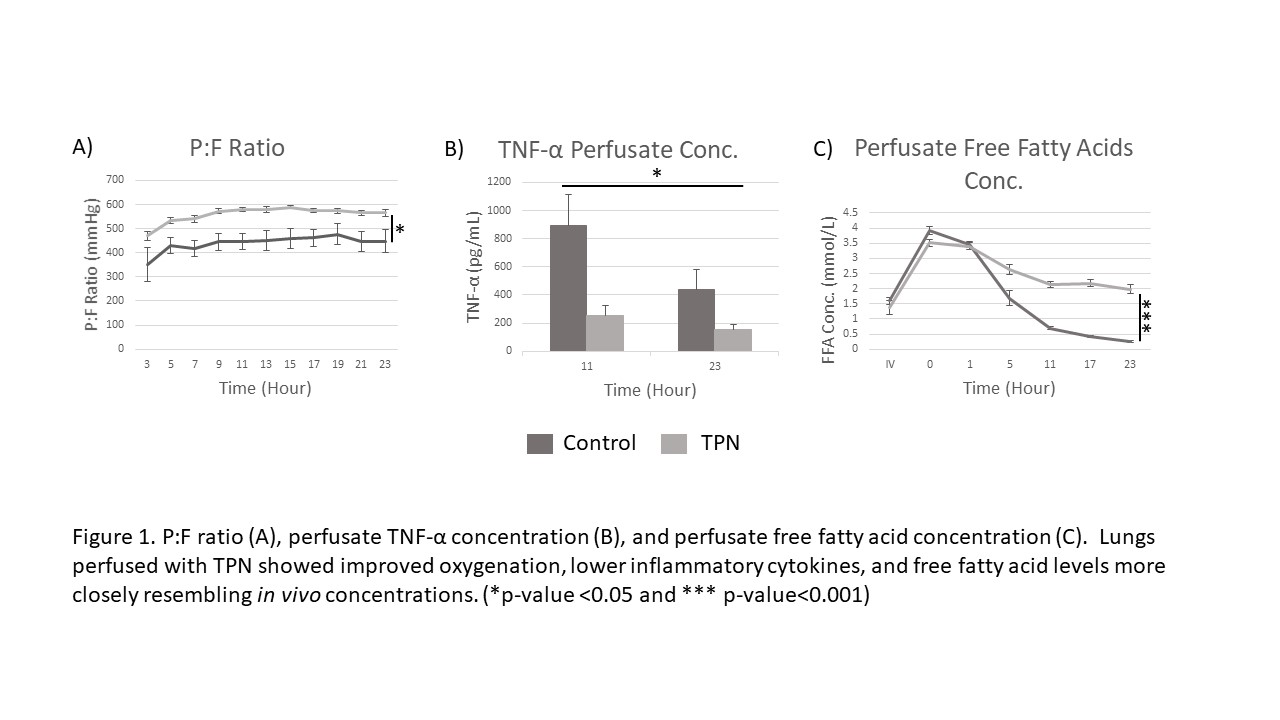Total Parenteral Nutrition in Ex Vivo Lung Perfusion: Addressing Metabolism Improves Both Inflammation and Overall Graft Performance
M. T. Buchko, S. Hatami, C. J. Stewart, S. Himmat, D. H. Freed, J. Nagendran
Department of Surgery, Division of Cardiac Surgery, University of Alberta, Edmonton, AB, Canada
Meeting: 2019 American Transplant Congress
Abstract number: 599
Keywords: Lung preservation, Lung transplantation, Machine preservation, Metabolic complications
Session Information
Session Name: Concurrent Session: Ischemia Reperfusion & Organ Rehabilition III
Session Type: Concurrent Session
Date: Tuesday, June 4, 2019
Session Time: 4:30pm-6:00pm
 Presentation Time: 4:30pm-4:42pm
Presentation Time: 4:30pm-4:42pm
Location: Room 313
*Purpose: Contemporary clinical ex vivo lung perfusion (EVLP) protocols generally limit metabolic supplementation to insulin and glucose. Furthermore, conventional perfusates are void of many ingredients considered essential for cellular viability. We sought to determine whether improved metabolic supplementation with total parenteral nutrition (TPN) would improve lung function and graft quality in prolonged EVLP.
*Methods: Ten porcine lungs were perfused using normothermic EVLP for 24 hours. Lungs in the control group (n=5) were perfused with a cellular perfusate and supplemented with insulin and glucose. In the treatment group, the perfusate was also supplemented with conventional TPN containing a continuous infusion of lipids and amino acids, as well as the addition of essential vitamins and cofactors to the original perfusate. Functional parameters including oxygenation, pulmonary vascular resistance, and dynamic compliance were evaluated. Edema formation (as indicated by percent weight gain) was used as a surrogate for lung injury. Electrolyte and lactate profiles were monitored. Perfusate lipid concentrations were also followed over time to assess whether free fatty acids were being utilized over time.
*Results: Lungs in both treatment and control groups demonstrated stable and acceptable oxygenation (partial pressure of arterial oxygen/ fraction of inspired oxygen ratio >350 mmHg) up to 24 hours; however, oxygenation was significantly higher in the TPN group (p0.01). Other physiologic parameters including compliance and pulmonary vascular resistance were not different between groups (p>0.05). Lactate was not different between groups (p>0.05). Electrolyte profiles including sodium were more stable in the TPN group (p0.04). Lipid analysis of the control group demonstrated a continuous depletion of free fatty acids over time. After initial stabilization, perfusate free fatty acid concentration in the TPN group were significantly higher than controls (p<0.001) and resembled in vivo levels. TNF-α was also significantly lower in the TPN group than the control group (p0.02).
*Conclusions: The addition of total parenteral nutrition in NPV-EVLP allows for better electrolyte composition, decreased inflammation, and improved graft performance in ex vivo lung perfusion up to 24 hours.
To cite this abstract in AMA style:
Buchko MT, Hatami S, Stewart CJ, Himmat S, Freed DH, Nagendran J. Total Parenteral Nutrition in Ex Vivo Lung Perfusion: Addressing Metabolism Improves Both Inflammation and Overall Graft Performance [abstract]. Am J Transplant. 2019; 19 (suppl 3). https://atcmeetingabstracts.com/abstract/total-parenteral-nutrition-in-ex-vivo-lung-perfusion-addressing-metabolism-improves-both-inflammation-and-overall-graft-performance/. Accessed January 7, 2026.« Back to 2019 American Transplant Congress

